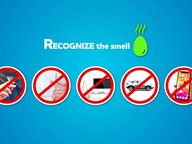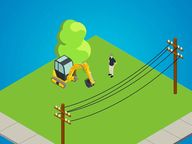Emergency?
Call 911 or your local emergency services immediately for:
- Downed power lines
- Natural gas leak
- Carbon monoxide (CO) alarm goes off
- Person or equipment touches a power line
- Electrical fire
Natural gas leak
Natural gas is a colourless, odourless, and highly flammable gas. We add a chemical compound called mercaptan to natural gas to give it a strong, sulphur-like or rotten egg smell. This allows natural gas leaks to be easily detected.
Do you know what to do if you smell natural gas?
Over half of all homes in Manitoba are heated with natural gas — and although leaks are rare, they can be dangerous. Watch to learn what to look for and how to deal with a natural gas leak.
If you smell natural gas, evacuate people and pets out of the area immediately.
- If inside a building, leave the doors open as you exit.
- From a safe place, call 911 or your local emergency services immediately.
- Do not smoke, light matches or lighters, operate electrical switches, appliances, phones, vehicles, or create any other source of ignition or sparks.
If you suspect a natural gas pipeline leak, evacuate people and animals out of the area immediately.
- Do not operate a vehicle. Starting a vehicle may create a spark, so you may have to walk out.
- Do not smoke, light matches or lighters, operate electrical switches, appliances, phones, vehicles, or create any other source of ignition or sparks.
- Shut down equipment (such as lawn mowers, tractors, and power tools) if it is safe to do so.
- Alert anyone who is nearby and stay upwind.
- From a safe place, call 911 or your local emergency services immediately.
Leaks from natural gas pipelines are rare but can be a fire hazard. Warning signs include rotten egg smell, bubbles in a ditch, pond or waterway, dirt being blown into the air, distinct patches of dead or discoloured vegetation, or a loud hissing noise.
Stay away from the building or area until safety officials say it is safe to return.
Safety data sheets
- Safety data sheet: Odourized natural gas (PDF, 180 KB)
- Safety data sheet: Precautionary label (PDF, 228 KB)
When natural gas is restored
Manitoba Hydro will relight natural gas appliances. If you do it yourself, follow the instructions on your equipment. If you need help, call us toll-free at 1-888-624-9376.
- Be sure your water heater is full of water before turning it on.
- Turn up the furnace thermostat.
- Turn off portable heaters.
If you leave your home, leave your contact information with a neighbour. An adult must be present to allow our utility service representative to enter the home to restore service. Our employees carry photo ID and will show it to you on request.
Carbon monoxide (CO) alarm goes off
If anyone has symptoms of CO poisoning:
- Evacuate people and pets immediately.
- From a safe place, call 911 or your local emergency services immediately.
If no one has symptoms of CO poisoning, your CO alarm or fuel-burning equipment may not be working properly:
- Immediately turn off the fuel-burning equipment.
- Evacuate anyone who may be at risk – children, the elderly, or pregnant women.
- Call us anytime at 204-480-5900 (Winnipeg) or 1-888-624-9376 (toll-free).
If your alarm does not go off but you have symptoms of CO poisoning that go away when you leave the building, call 911 or your local emergency services immediately.
Do you know the dangers of carbon monoxide?
Learn how to identify CO build up in your home and CO poisoning symptoms.
Person or equipment touches a power line
Call 911 or your local emergency services immediately. Do not touch a person in contact with a power line.
If a person is in contact with high voltage power lines or underground cables:
- Throw a heavy object (wooden tool, dry rope, hose, wood board) to try separate the victim from the power line. Do not touch the object again after it has been thrown.
If equipment comes into contact with overhead power lines or underground cables:
- Keep everyone at least 10 metres away from the equipment, its load, and any fallen power lines.
- Do not touch a winch line or the equipment load.
Rubber boots and gloves will not insulate you from a high voltage line — you can receive serious injuries or die. Rubber tires can conduct electricity and may explode or burn.
Overhead power line safety
Overhead power lines can be hazardous around large equipment. Watch to learn how to be safe around overhead power lines and what to do if you contact one.
Electrical fire
Call 911 or your local emergency services.
Never put water on an electrical fire as it will spread. If the fire is large, do not try to put it out yourself — get everyone to safety.
If electrical equipment catches fire:
- Disconnect the power if it is safe to reach the cord or outlet.
- Only use a multi-purpose Class C fire extinguisher.



